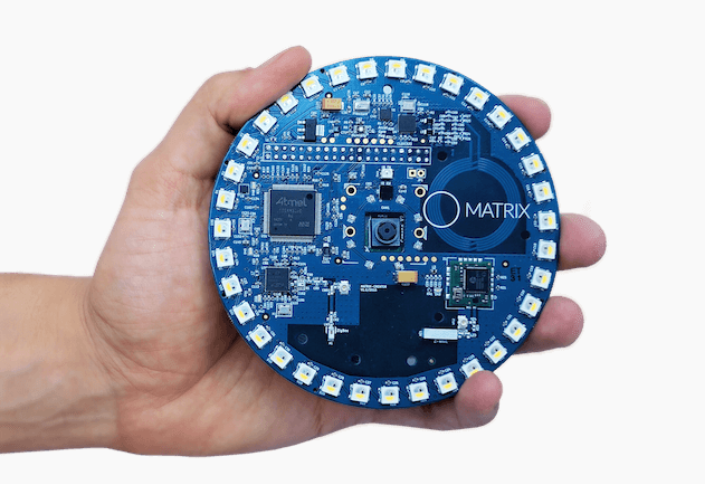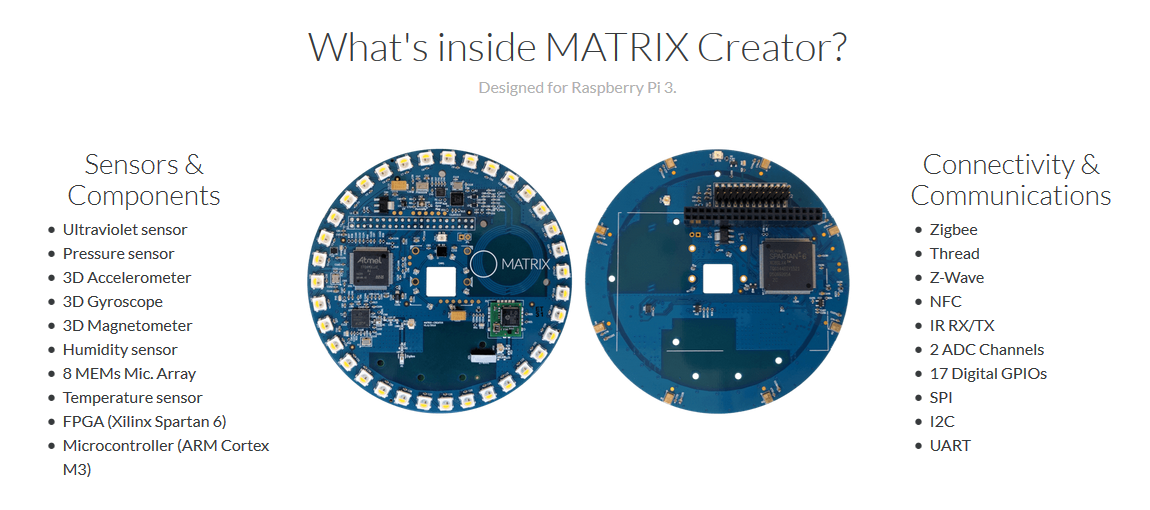
Development boards are a staple of the Maker movement, and this year’s Washington DC Maker Faire showcase did not fail to impress. Promising an IoT-ready platform that lets users build computer vision, home automation, robotics, and other custom hardware solutions, the Miami-based AdMobilize fielded a fancy Raspberry Pi shield called the MATRIX Creator, which comes readymade with 15 built-in sensors.
From a hardware perspective, MATRIX Creator is an absolute bombshell, consolidating an ultraviolet sensor, pressure sensor, 3D accelerometer, 3D gyroscope, 3D magnetometer, humidity sensors, 8 MEMs microphone arrays, a temperature sensor, 36 LEDs, as well a Xilinx Spartan 6 FPGA and an Atmel ARM Cortex M3 microcontroller. Connectivity and communication standards are equally abundant, consisting of Zigbee, Thread, Z-wave, NFC, IR RX/TX, 2 ADC Channels, 17 digital GPIOS, SPI, 12C, UART.

With its robust hardware and a circular form factor of approximately four-and-a-half inches in diameter, the board present a compact form factor, a significant step up from the size of boards whose hardware was built from scratch. AdMobilize programming and R&D analyst Alfred Gonzalez-Cuzan pointed out to Electronic Products that the MATRIX Creator packs an additional row of general purpose input/outputs (GPIO) “in case you want to add anything else like a servomotor, or something we haven’t thought of.”
MATRIX Creator aims to satisfy both novices and experts alike, offering a simplified Linux-based OS that runs on the PI and is programmable in JavaScript, with Python and C++ later to come. Users simply select a pre-existing app from the company’s app store, or use it as a foundation for creating their software; alternative, those who prefer coding their hardware from scratch may also do so.
It gets better, users interested in building more advanced sensing applications with a face, gesture and object detection, can access a pre-existing computer vision library for free. “Since we have an MCU, all these sensors operate in real-time, so you’re not relying on the raspberry pi’s processor to do much of the sensor work,” Alfred told Electronic Products.
Now if you’re ambitious enough to create a hardware application reliant on multiple Raspberry Pis running in unison, the MATRIX CLI offers a hardware simulator for that purpose too.
Visit creator.matrix.one if you’re interested in procuring your own unit. The MATRIX Creator is available for $99 plus shipping. It launched on June 18, 2016, during the first day of the Washington DC Maker Faire.
Advertisement
Learn more about Electronic Products Magazine





